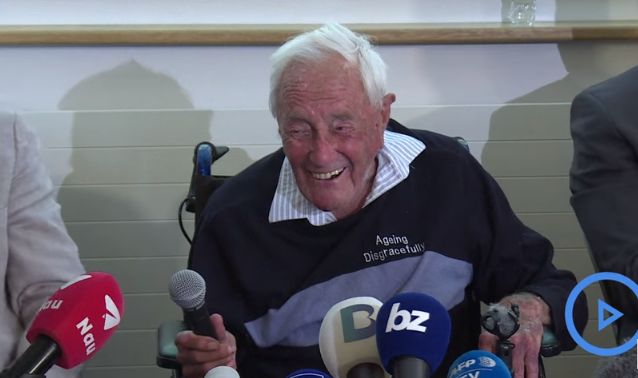Elderly Scientist Who ‘Regretted’ Living to 104 Ends Life by Lethal Injection in Switzerland

BASEL, Switzerland — An elderly scientist who was not terminally ill, but who said he was “not happy” as he was losing his eyesight and independence, ended his life on Thursday by lethal injection in Switzerland. The man said he had no belief in the afterlife and didn’t want a remembrance service either.
David Goodall, a botanist and ecologist from Perth, Australia, died with his grandchildren at his side at the Lifecircle assisted suicide center in Switzerland. He appeared before reporters the day before, wearing a sweater that bore the phrase “aging disgracefully.”
“At my age, and even rather less than my age, one wants to be free to choose the death and when the death is the appropriate time,” Goodall asserted.
He traveled to the country this week with the aid of the assisted suicide group Exit International, which had raised thousands of dollars in donations from those who supported Goodall’s quest to end it all because he “regrets” living so long.
As previously reported, Goodall turned 104 last month, being surrounded by family members who threw him a party, and was asked by reporters in Australia if he had a nice birthday.
“No, I’m not happy. I want to die,” he replied.
Goodall had argued that his “quality of life” wasn’t as good as it used to be, outlining that his eyesight was failing and that he needed to be assisted when crossing the street or taking public transportation. He also said that he wasn’t able play tennis or perform in theater like he used to into his 90’s, and most of his friends had died.
“Once one is past the stage of middle life, one has paid back to society the debts that have been paid out. One should be free to use the rest of his life as one chooses,” Goodall told the Australian Broadcasting Corporation (ABC News). “If one chooses to kill oneself then that’s fair enough. I don’t think anyone else should interfere.”
He told reporters this week that he hopes his story paves the way for more elderly people to kill themselves if they are no longer satisfied with living.
“I’d like to be remembered as an instrument for freeing the elderly to choose their own death,” Goodall told reporters on Wednesday.
According to the Seattle Times, an IV was inserted into his arm at at approximately noontime on Thursday, and as required under Swiss law, he personally turned the wheel to administer the deadly drugs into his bloodstream. He lost consciousness and died soon afterward.
A press release from Exit International said in a statement that Goodall wanted his body donated to medicine, and if that was not possible, he wanted to be cremated and have his ashes sprinkled locally.
“He wishes to have no funeral, no remembrance service or ceremony. David has no belief in the afterlife,” the statement outlined.
Others have found the situation to be deeply concerning, including Alex Schadenberg of the Canada-based Euthanasia Prevention Coalition.
“Sadly, the David Goodall story is part of the world-wide campaign to promote the legalization of euthanasia or assisted suicide. The fact that he is 104 years-old is an attempt by the euthanasia lobby to promote killing people because they are elderly and want to die,” he told Christian News Network last week.
“They’ve raised thousands and thousands of dollars now to send this guy to Switzerland—for lethal drugs,” Schadenberg also remarked to OneNewsNow. “To me, this is a real abandonment of a guy who is feeling that his life has lost [its] purpose, and maybe he’s tired of living, but you know there are lots of people who feel that their life has lost purpose and they’re tired of living. Should we now start a fundraising campaign for all of them to go to Switzerland?”
He said that the argument from the euthanasia lobby now boils down to autonomy, and the belief that one should have the “freedom to choose” to die.
2 Corinthians 5:15 reads, “He died for all, that they which live should not henceforth live unto themselves, but unto Him which died for them, and rose again.”
Hebrews 9:27 also outlines, “[I]t is appointed unto men once to die, but after this the judgment.”
Become a Christian News Network Supporter…
 Dear Reader, has ChristianNews.net been of benefit and a blessing to you? For many years now, the Lord has seen fit to use this small news outlet as a strong influential resource in keeping Christians informed on current events from a Biblical worldview. Despite Facebook’s recent algorithm changes, which has limited our readership, and, as a result, has affected operational revenue, we continue to strive to bring you the news without compromise and to keep Christ in focus. If you have benefited from our news coverage, would you please prayerfully consider becoming a Christian News supporter by clicking here to make a one-time or monthly donation to help keep the truth widely and freely published and distributed? May Christ continue to be exalted through this work!
Dear Reader, has ChristianNews.net been of benefit and a blessing to you? For many years now, the Lord has seen fit to use this small news outlet as a strong influential resource in keeping Christians informed on current events from a Biblical worldview. Despite Facebook’s recent algorithm changes, which has limited our readership, and, as a result, has affected operational revenue, we continue to strive to bring you the news without compromise and to keep Christ in focus. If you have benefited from our news coverage, would you please prayerfully consider becoming a Christian News supporter by clicking here to make a one-time or monthly donation to help keep the truth widely and freely published and distributed? May Christ continue to be exalted through this work!





Comments are closed.